| Srl | Item |
| 1 |
ID:
095465
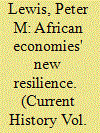

|
|
|
|
|
| Publication |
2010.
|
| Summary/Abstract |
Near-term prospects for the region's economies are encouraging when one considers the enormous shocks of the recent crisis and the depth of the global downturn.
|
|
|
|
|
|
|
|
|
|
|
|
|
|
|
|
| 2 |
ID:
018040
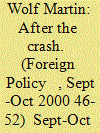

|
|
|
|
|
| Publication |
Sept-Oct 2000.
|
| Description |
46-52
|
|
|
|
|
|
|
|
|
|
|
|
|
|
|
|
| 3 |
ID:
085315


|
|
|
|
|
| Publication |
2008.
|
| Summary/Abstract |
Despite the increasing integration of markets, most political scientists contend that governments retain much policy "room to maneuver." Moreover, citizens presumably support further economic integration because they believe their governments can cushion the impacts of market forces. In this sense, globalization is compatible with democracy. Rarely, however, are data provided that demonstrate citizens' appreciation for the room to maneuver, let alone their positive evaluation of it. Who do citizens identify as most responsible for the performance of the U.S. economy, elected officials or national and international market forces? Which citizens attribute economic performance to these forces and not to their elected officials? In this article, we report results from an original experiment designed to answer these questions. We find that a good number of Americans believe that their government retains the room to maneuver. However, there exists a substantial minority that does not. We show, consistent with recent developments in the study of political psychology on distal associations and partisan motivated reasoning, that this minority is characterized according to partisanship, knowledge levels, and age. Republican partisans and more educated citizens believe there is less room to maneuver than Democratic partisans and members of older age cohorts. Generational factors also shape beliefs in the efficacy of policy control. Finally, priming subjects to think about economic globalization does not affect their responsibility attributions. The choice set matters, however. When provided the option, a significant number of respondents assign responsibility to market forces rather than elected officials.
|
|
|
|
|
|
|
|
|
|
|
|
|
|
|
|
| 4 |
ID:
130868
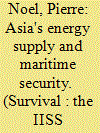

|
|
|
|
|
| Publication |
2014.
|
| Summary/Abstract |
Asia's reliance on international, seaborne energy trade is conducive to strategic cooperation. Whether this will outweigh strategic competition is far from certain. The Asia-Pacific accounts for a large and growing share of the world's energy-demand growth. With imports rising faster than consumption, the region is rapidly becoming the new centre of gravity for global energy markets. Such dynamics have made energy security a key policy concern for Asian states. The naval capacities of these countries are also growing swiftly, prompting some analysts to ask whether an arms race has begun. Although no one would suggest that this build-up of naval power is primarily driven by the need to secure energy supplies, the Chinese and Indian governments have identified energy and resource security as one rationale for developing naval power, particularly blue-water capabilities.
|
|
|
|
|
|
|
|
|
|
|
|
|
|
|
|
| 5 |
ID:
027833
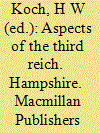

|
|
|
|
|
| Publication |
Hampshire, Macmillan Publishers Ltd, 1985.
|
| Description |
viii, 611p.Hbk
|
| Standard Number |
0333352726
|
|
|
|
|
|
|
|
|
|
|
|
Copies: C:1/I:0,R:0,Q:0
Circulation
| Accession# | Call# | Current Location | Status | Policy | Location |
| 028728 | 943.086/ASP 028728 | Main | On Shelf | General | |
|
|
|
|
| 6 |
ID:
126866
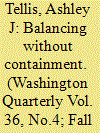

|
|
|
| 7 |
ID:
055015


|
|
|
| 8 |
ID:
089978
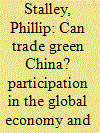

|
|
|
|
|
| Publication |
2009.
|
| Summary/Abstract |
How does participation in the global economy influence the pollution management practices of firms in a developing country? Research on trade and the environment leads one to anticipate that integration into the international economy should enhance domestic firm environmental behavior. Integration facilitates access to cleaner technology, exposes domestic firms to global norms of corporate environmentalism, and compels developing country firms to meet trading partners' environmental standards or risk losing market access. This article tests these propositions by exploring the environmental compliance of internationally oriented firms in China-a country whose rapid economic expansion and increasingly prominent role as a foreign investor have considerable implications for protection of the global environment. It finds that there is only modest market-induced enhancement of environmental performance among Chinese companies. In terms of their compliance with environmental law, Chinese firms with connections to the global economy are either no better than domestically oriented companies or, in the case of firms that export heavily, are worse.
|
|
|
|
|
|
|
|
|
|
|
|
|
|
|
|
| 9 |
ID:
021833
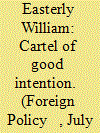

|
|
|
|
|
| Publication |
July-Aug 2002.
|
| Description |
40-49
|
|
|
|
|
|
|
|
|
|
|
|
|
|
|
|
| 10 |
ID:
070420


|
|
|
| 11 |
ID:
130973
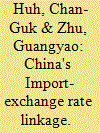

|
|
|
|
|
| Publication |
2014.
|
| Summary/Abstract |
This paper examines how the China-bound exports of Japan and Korea are related to exchange rates, motivated by the fact that processing trade makes up a large proportion of China's trade, and that Japan and Korea are the leading source countries for processing imports. Because processing imports are inputs for exports, the link between such imports and China's exchange rates are ambiguous. We estimate export functions that include China's RMB real effective exchange rates (REER) along with bilateral real exchange rates (BRER) using Johansen's cointegration method and find that the RMB REER significantly affects Japanese and Korean exports to China, even more so than BRER in most cases examined. These two exchange rates appear in the export equations with opposite signs. Subsequently, we use the estimated model to illustrate the importance of accounting for a concurrent change in BRER when analyzing the effects of a hypothetical RMB revaluation on China's trade balances despite the apparently weak imports-BRER linkage.
|
|
|
|
|
|
|
|
|
|
|
|
|
|
|
|
| 12 |
ID:
139267
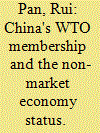

|
|
|
|
|
| Summary/Abstract |
This article provides a Chinese perspective on the terms of China's WTO accession, highlighting the negative impact of some discriminatory conditions that China accepted in order to join the WTO on its foreign trade and global competitiveness in the last decade. The author uses the non-market economy status of China as a case study to support the argument that these discriminatory conditions imposed on China upon accession have not only impeded the healthy development of China's foreign trade, but also violated the ‘non-discrimination’ principle of the WTO.
|
|
|
|
|
|
|
|
|
|
|
|
|
|
|
|
| 13 |
ID:
057312
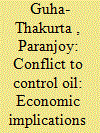

|
|
|
| 14 |
ID:
137705
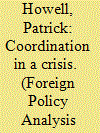

|
|
|
|
|
| Summary/Abstract |
This article explores possible theories of international economic policy coordination, and then proceeds to test these theories through a qualitative analysis of four EU member states – Germany, France, Belgium, and the Netherlands – and their preferences and experiences during the financial market crisis period of Fall/Winter 2008–2009. Both institutional and basic realist theories for coordination preferences are evaluated for explanatory power against the case of the 2008 financial crisis and are found lacking. Instead, this analysis finds that a comparative foreign policy theory of political constraints – institutional design, political polarization, and leader time horizons – emerges as the best fit for explaining the divergence in foreign policies among these EU member states.
|
|
|
|
|
|
|
|
|
|
|
|
|
|
|
|
| 15 |
ID:
131414
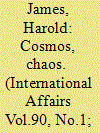

|
|
|
|
|
| Publication |
2014.
|
| Summary/Abstract |
The article explores parallels between the fragility of globalization on the eve of the First World War, in the aftermath of the financial crisis of 1907, and today's crisis of globalization following the post-2007 recession. The fragility and interconnectedness of the international economy in both cases could provide a basis for an economic-military strategy. The temptation of using economic connectedness as a substitute for conventional and costly military strategy makes this course particularly attractive to a hegemon-the UK then, the US now-that is facing powerful competition from rising powers (Germany and the US then, China now). The challengers are likely to find their own alternative strategy, and the result breeds uncertainty. In consequence, rule-based international orders are generally strained by transitions of power, even though all the parties see the desirability and need for a common system of rules
|
|
|
|
|
|
|
|
|
|
|
|
|
|
|
|
| 16 |
ID:
023028


|
|
|
|
|
| Publication |
2002.
|
| Description |
193-219
|
|
|
|
|
|
|
|
|
|
|
|
|
|
|
|
| 17 |
ID:
020797


|
|
|
|
|
| Publication |
Feb 1, 2002.
|
| Description |
239-245
|
|
|
|
|
|
|
|
|
|
|
|
|
|
|
|
| 18 |
ID:
072261
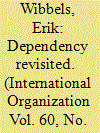

|
|
|
|
|
| Publication |
2006.
|
| Summary/Abstract |
While increased exposure to the global economy is associated with increased welfare effort in the Organization for Economic Cooperation and Development (OECD), the opposite holds in the developing world. These differences are typically explained with reference to domestic politics. Tradables, unions, and the like in the developing world are assumed to have less power or interests divergent to those in the OECD-interests that militate against social spending. I claim that such arguments can be complemented with a recognition that developed and developing nations have distinct patterns of integration into global markets. While income shocks associated with international markets are quite modest in the OECD, they are profound in developing nations. In the OECD, governments can respond to those shocks by borrowing on capital markets and spending countercyclically on social programs. No such opportunity exists for most governments in the developing world, most of which have limited access to capital markets in tough times, more significant incentives to balance budgets, and as a result cut social spending at the times it is most needed. Thus, while internationally inspired volatility and income shocks seem not to threaten the underpinnings of the welfare state in rich nations, it undercuts the capacity of governments in the developing world to smooth consumption (and particularly consumption by the poor) across the business cycle.
|
|
|
|
|
|
|
|
|
|
|
|
|
|
|
|
| 19 |
ID:
056833
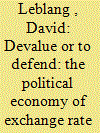

|
|
|
| 20 |
ID:
132599
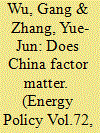

|
|
|
|
|
| Publication |
2014.
|
| Summary/Abstract |
Whether China's crude oil imports are the culprit of oil price volatility these years has not been quantitatively confirmed. Therefore, this paper empirically investigates the role of China's crude oil net imports in Brent price changes from October 2005 to November 2013 based on an econometric analysis. The results indicate that, during the sample period, China's crude oil imports do not significantly affect Brent price changes, no matter in the long run or short run. Therefore, the blame for China's crude oil imports to cause the dramatic fluctuations of international oil price has no solid evidence. Also, there exists significant uni-directional causality running from the Brent price to China×s crude oil imports at the 5% level. Besides, the response of the Brent price to China×s crude oil imports is found positive but slight, and the Brent price responds more significantly to US dollar exchange rate and OECD commercial inventory than to China's crude oil imports in the short run. Finally, the contribution of China×s crude oil imports to Brent price movement is about 10%, which is less than that of US dollar exchange rate but larger than that of Indian crude oil imports or OECD commercial inventory.
|
|
|
|
|
|
|
|
|
|
|
|
|
|
|
|